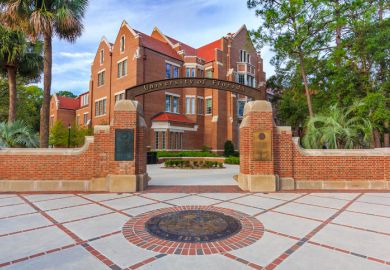In May 2023, two weeks before Florida governor Ron DeSantis officially announced his run for the Republican presidential nomination, he signed a law threatening public sector unions’ continued funding – and existence.
Senate Bill 256 said that if fewer than 60 per cent of workers in a union’s bargaining unit paid dues, employees who wanted to keep their union representation would have to win another representation election. Simultaneously, the new law forbade public employers, such as state colleges and universities, from deducting union dues from the paychecks of workers who wanted to pay those dues, forcing unions to find another way to collect that money.
The law also required that employees who wished to join unions signed “membership authorisation forms” that showed the names, salaries and other compensation, “including reimbursements”, paid to the union’s five highest-compensated employees.
Public college and university unions weren’t exempted from these effects of the law, as unions representing law enforcement officers, correctional officers and firefighters were. Mr DeSantis’s office didn’t provide an interview; a spokeswoman referred to comments he made on 19 March to conservative talk radio host Dana Loesch.
“Parents in some of these deep blue states, they send their kids to school and it’s pure indoctrination, and they don’t want that,” Mr DeSantis said. “They know if they go to Florida they’ve got a state government – certainly me as governor, but also our legislature – that’s fighting for them and for their kids...I think this does tie into the indoctrination issue. We did paycheck protection for teacher union dues…We empowered the rank and file to say, ‘wait a minute, this union is pursuing a political agenda’.”
While Mr DeSantis’s presidential campaign is over, the law lives on. The dues deduction shutoff took effect in July, and other provisions took effect in October, all affecting higher education unions. State lawmakers sent Mr DeSantis another bill this year to update the law, including adding paramedics to the exempted unions. He has yet to sign it.
Florida’s Public Employees Relations Commission has now decertified about 20 higher education bargaining units in Florida, according to a state database shared by the Miami-based public radio and television station WLRN in an investigation about the law’s impact on unions broadly.
All the affected higher education workers – at institutions such as Florida State University, the University of Central Florida and the University of North Florida – were represented by the American Federation of State, County and Municipal Employees (AFSCME), whom a spokesman said did not represent instructional employees. AFSCME represents many different types of workers, such as custodians, groundskeepers and financial aid specialists. Gregg Morton, the Public Employees Relations Commission’s general counsel, told Inside Higher Ed that “I'm not aware of any faculty unions that have been decertified at this point”.
The commission’s written orders revoking certification suggest that AFSCME didn’t strongly contest those decertifications. Most were based on the union not submitting a form required after failing to meet the 60 per cent threshold to move forward with the new election to stay certified.
“The union failed to file the above-referenced recertification petition,” says one typical example of a decertification order. “Thus, on 18 December, the commission ordered the union to show cause by no later than 5 January, 2024, why the certification should not be revoked for failure to comply with section 447.305(6), Florida Statutes. The union did not file a response.”
Mr Morton said no elections had yet been held by unions trying to save their certification under the law. While 60 per cent is the threshold for paying dues, if a union fails to meet that they only have to get above 50 per cent in the subsequently required election to save themselves, he said. But having that election takes signatures from at least 30 per cent of members of the bargaining unit, and Mr Morton said perhaps some organisations couldn’t even get that.
There are elections coming – the United Faculty of Florida is trying to preserve its representation of workers in multiple bargaining units. David Hecker, the union’s interim executive director, said it had 34 bargaining units across the state and, so far, 11 hadn’t met the 60 per cent threshold and would be required to win another election.
He said all of those had got the signatures needed to have the elections. “They’re all going to be OK,” Mr Hecker said.
Even if they were, he said, the law was harmful. Complying with it meant “time and resources not spent doing other things” and “a majority of my time as interim executive director has been spent on working with our staff and chapters for the great work they’re doing to meet the requirements of [Senate Bill] 256”, he said.
Teresa M. Hodge, the United Faculty of Florida president, said the union made “a concerted effort” to not lose any bargaining units to the law. “It’s been hands on, day one,” she said.
She called the law “a distraction to keep us off-footed”. And she noted its requirements were annual requirements. “Every year we have to do this – every year,” she said.
This is an edited version of a story that first appeared in Inside Higher Ed.
Register to continue
Why register?
- Registration is free and only takes a moment
- Once registered, you can read 3 articles a month
- Sign up for our newsletter
Subscribe
Or subscribe for unlimited access to:
- Unlimited access to news, views, insights & reviews
- Digital editions
- Digital access to THE’s university and college rankings analysis
Already registered or a current subscriber? Login








